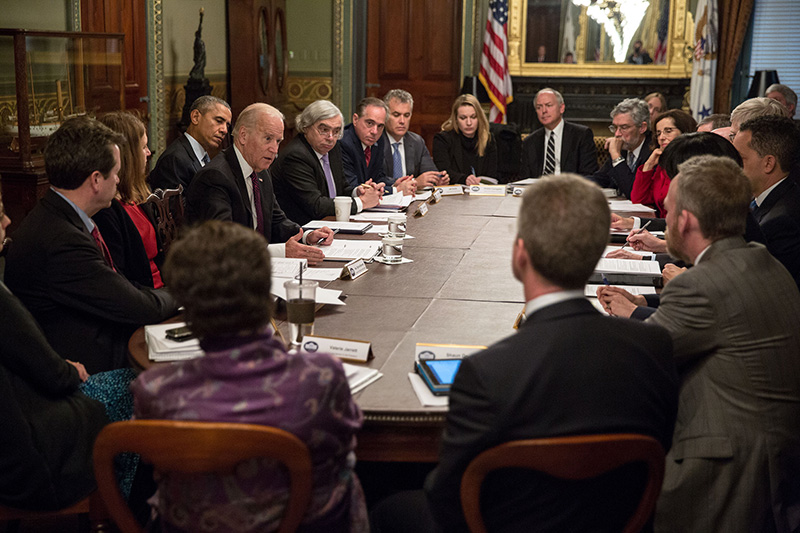
Today, Vice President Joe Biden chaired and convened the first meeting of the Cancer Moonshot Task Force, a first-of-its-kind federal task force to carry out our call for a moonshot to end cancer as we know it.
Check out the message he sent ahead of the meeting and highlights from the Twitter Q&A with Dr. Francis Collins, Director of the National Institutes of Health, and Dr. Douglas Lowy, Acting Director of the National Cancer Institute.

Message from Vice President Biden:
During his final State of the Union, the President put me in charge of a new national commitment to ending cancer as we know it.
We're calling it a "Moonshot," and that's because I believe that this effort, like President Kennedy's call to land on the moon 55 years ago, is truly a call to humankind -- to be bold and do big things.
And right now, I'm about to walk into the very first meeting of the Cancer Moonshot Task Force the President just created, and tasked me with chairing.
Here's what it all means.
Every single federal agency with a part to play in this mission -- from the National Institutes of Health and Food and Drug Administration to the Department of Veterans Affairs and Department of Energy and its national energy labs -- will be in the same room together to make sure we're working from the same playbook.
We'll make sure we're making the most of investments, of our research and data, our supercomputing capabilities, our targeted incentives, private-sector efforts, and patient-engagement initiatives.
In fact, just today we announced a new 1 billion dollar jumpstart to make sure some of the best work going on has the funding that it needs.
Because ultimately, as the federal government, our job is to break down silos and bring people together who are doing the most cutting-edge work. Our job is to clear out the bureaucratic hurdles -- and let science happen.
And we're going to continue to call on families, researchers, and physicians all across the country to join this effort and rise to the challenge.
I've been in touch with hundreds of the world's top cancer physicians, researchers, and philanthropists.
And I’ve been in touch with Americans around the country who know the realities of this disease firsthand, people who have lived through it and people who have lost their loved ones they hold most dearly.
If you’ve got a story to tell about how this disease has touched your life, I want to hear from you.
And following the meeting, at around 3:30 p.m. Eastern, Dr. Francis Collins, Director of the National Institutes of Health, and Dr. Douglas Lowy, Acting Director of the National Cancer Institute, will be taking your questions on Twitter. You can ask them using #CancerMoonshot.
As the President said in the State of the Union, we can do this for the loved ones we've lost -- and the families we can still save.
I couldn't agree more. If there is one word that defines us as Americans, it's "possibility." And I believe this is possible.
I know that we can do this.
I'll be in touch along the way with ways you can help -- believe it.
Thank you,
Joe
Didn't get the email? Sign up here for updates.
Highlights from the Twitter Q&A:
The initiative will focus on research areas that provide great opportunity to change the future for all affected by cancer. #cancermoonshot
— Dr. Doug Lowy (@NCIDrDoug) February 1, 2016
So from the perspective of a scientist and cancer researcher, today is an important day for all of us #CancerMoonshot
— Dr. Doug Lowy (@NCIDrDoug) February 1, 2016
By 2025, an estimated 2.1 million people in the U.S. will be diagnosed with cancer each year, a 31% increase from 2012 #CancerMoonshot
— Dr. Doug Lowy (@NCIDrDoug) February 1, 2016
.@NIHDirector @VP How can cancer survivors and advocates best contribute to this critically important mission? #CancerMoonshot
— Scott Joy (@scottjoy) February 1, 2016
.@scottjoy Cancer advocates can help us by insisting on broad #data access for all #clinicaltrials #CancerMoonshot #NIH
— Francis S. Collins (@NIHDirector) February 1, 2016
.@_genevieve @NCIDrDoug It is all of those things and more! See factsheet: https://t.co/lfmvwUe55g
— Francis S. Collins (@NIHDirector) February 1, 2016
Learn more:

